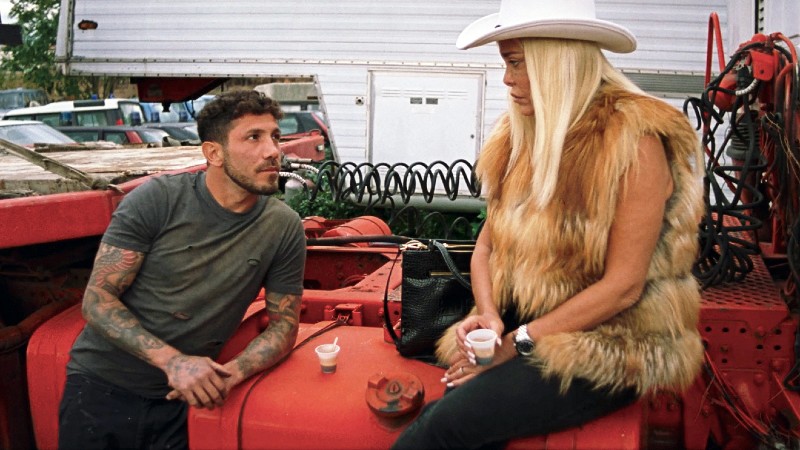




The viewer walks into the film Vera with the eponymous protagonist, played by Vera Gemma, daughter of Giuliano Gemma, the Spaghetti Western star, as she joins a media event in Rome, stopping for photos before going into the venue. After a bit of greeting and dancing, she walks off alone along a dingy street (in high contrast with the tacky glitz of the previous sequence), and orders a drink at a run-of-the-mill bar, where she engages in a philosophical chat about beauty with the barkeeper. She then heads off home in a cab, whose driver she invites to spend the night with her. He politely declines as he is engaged.
This opening sequence gives us an initial and intriguing impression of Vera in her plastically enhanced body and choice of attire. Cut to the morning and she emerges from her house (a motif throughout the film) as her loyal driver, Walter (Walter Saabel), awaits her, to go to another unsuccessful film audition – a period piece, but her face was too modern for it, according the casting director, who nonetheless asks for a selfie when he finds out she is the daughter of Giuliano.
Later we see her in bed with a hunk, an aspiring director who would like to get Monica Bellucci cast in his film and hopes Vera could use her connections. Vera seems doomed to dwell in the shadow of her father, living off inherited wealth that, we are informed in one scene, is not as abundant as it once was.
Up to a good half hour into the film, we are not quite sure what kind of beast it is: maybe a parody of Roman film celebrity life, perhaps a film version of a reality TV show about Vera. It is this lack definition that gives the film a subtle irony and tenderness, and rewards it a viewing, despite its downbeat Super 16mm surface and somewhat sedate pace. Vera and the directors won the Venice Horizons award last year for best address and director, respectively. This is probably due to the the humanity the film exudes, and how the directors managed to turn Vera into a compelling character for whom we increasingly care as the film progresses. Passing moments of comic relief and subtle cultural references add some shine to the proceedings.

The dramatic peak of the film is served when Vera’s driver hits a motorbike and knocks off to the ground the boy on the backseat after dodging a group of children playing in the street in one of Rome’s peripheral and impoverished districts. The father, Daniel (played by Daniel de Palma) gets into an altercation with Walter but Vera quickly interferes and offers to take Manuel (Sebastian Dascalu) to hospital, where they find out he’d broken his arm. Daniel is the type of Pasolinian actor who would not be out of place in Accatone (1961), and cuts a contrasting figure with Vera’s motley cowboy-hatted figure.
She develops a relationship with Manuel’s down-and-out family, starts visiting them and taking the boy to do novel things, such as see a film at the theatre. Back in her privileged milieu, she meets Asia Argento (Asia Argento), herself the daughter of a famous movie star (director Dario Argento), who invites her to go into the cemetery where they visit the tombstone of Goethe’s son, who is identified only as such. The two women engage in a light-hearted banter about this warning from history and move on to another tomb, that of the wife of the poet Keats, who is identified as such. “‘Wife of’ is worse than ‘son of””, quips Vera. The two women living in the shadow of their famous fathers realize there is a lesson from the dead – the writing, it seems, is on the tombstone.
There is no climax and no redemption for Vera, although we may interpret Vera’s win in Venice as a real-life extension of the film itself as it continues its journey beyond the fictional diegesis. After all, the two dimensions of the film are inextricably entwined.
Despite its focus, Vera goes beyond the famous parent theme and touches upon deeper philosophical issues such as the meaninglessness and random nature of life. When Vera closes, the protagonist has endeared the viewer to her unpretentious, good-hearted persona, a woman floating through life in search of her own identity. The takeaway from the film is that perhaps we all experience, at one point or perhaps often, the feeling that we are nothing but flotsam in the complicated, often cruel ocean of human relations.
Vera shows at WatchAUT 2023: Austrian Film Festival, which takes place in London between March 23rd and 26th. Just click here for more information.











